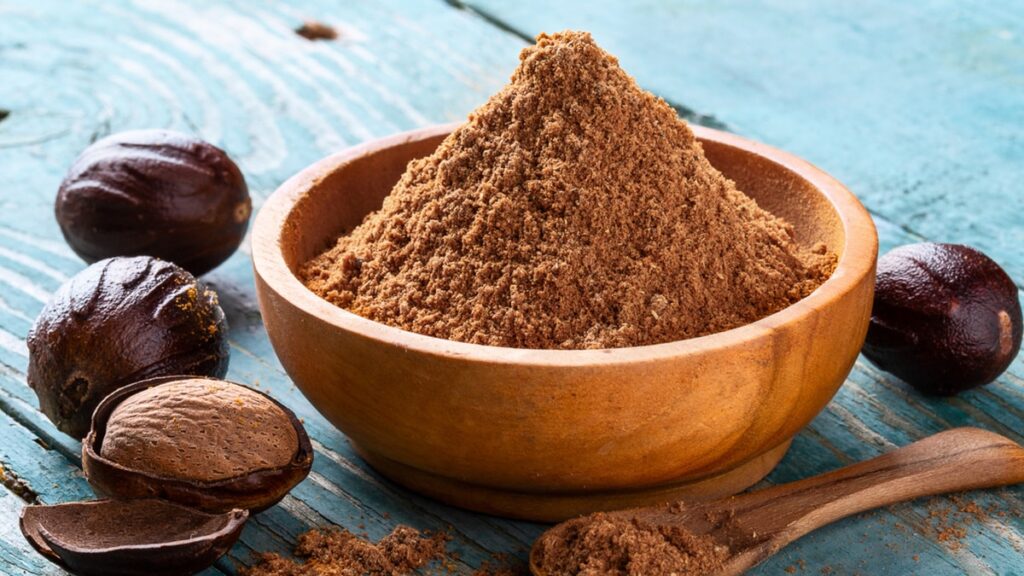5 Reasons Why Nutmeg (Jaiphal) Tea Is Good For You: How to Make It

[ad_1]
Indian spices have been a part of global medical practices for centuries. Whether in the form of churan, kadha, or herbal tea, these masalas have been beneficial to our health in more than one way. While some of these spices have gained global recognition, others still need to receive their due credit. One such spice is nutmeg (or jaiphal). The Indian palate is quite familiar with nutmeg, valued for its rich flavour and sweet aroma. Although the spice has its origins in Indonesia, as per food historians, it travelled to the shores of Southern India and gradually became a part of Indian masalas used in our everyday meals. Nutmeg’s credibility is further enhanced by its medicinal properties. According to nutritionist Ritesh Bawri, “Nutmeg is an excellent source of fibre, magnesium, manganese, vitamin B, and other essential minerals. However, it also contains saturated fats, which, if consumed in large quantities, can be harmful to health.” Therefore, it is always advised to consume nutmeg in the right amount to maximise its benefits.
How Much Nutmeg Should You Take Daily:
Nutmeg is safe to consume in small amounts. According to a report on WebMD, one can have a daily dose of two teaspoons (or five grams) of nutmeg to enjoy all its benefits without any worries. However, the dosage may vary from person to person depending on their age, gender, and tolerance level. Hence, it is always advised to consult an expert to determine the exact dosage suitable for your health.
Also Read: Nutmeg (Jaiphal) For Skin: How To Use The Wonder Spice In Your Beauty Regime

Photo Credit: iStock
What Is the Best Way to Consume Nutmeg:
Nutmeg is primarily consumed as a spice in various cuisines. It adds layers of flavour and aroma to dishes, enhancing the overall meal experience. Some people also use nutmeg oil for various health and beauty purposes. However, in our opinion, the best way to consume nutmeg is in the form of tea. Infusing nutmeg dust in hot water helps release its oil, adding its goodness to the drink in its purest form. Let’s explore some of the major benefits of drinking nutmeg tea. Read on.
5 Health Benefits of Nutmeg Tea:
1. Helps with weight loss:
Nutmeg tea can be a part of your weight loss diet due to its high antioxidant content. It helps eliminate toxins from your body, improving metabolism, digestion, and blood circulation. These factors combined make the drink beneficial for weight loss.
2. Relaxes nerves:
The tea is said to have a calming effect on the nerves. It helps release serotonin hormones in the body, relieving stress and promoting restful sleep. Hence, people often drink this tea at night to improve sleep quality.
3. Relieves pain:
Nutmeg contains volatile oils, including myristicin, elemicin, eugenol, and safrole, which, according to experts, help heal muscles and relieve joint pain when infused in tea.
4. Improves mental health:
Nutmeg is an adaptogen known to ease fatigue, stress, and anxiety while uplifting mood. These factors contribute to overall improved mental health. According to experts, tea may also help improve concentration.
5. Aids in achieving glowing skin:
Nutmeg tea, with its antioxidants and anti-inflammatory properties, is great for your skin too. It helps prevent oxidative stress and promotes blood and oxygen flow to the skin cells, nourishing them and giving your skin a natural glow.
How to Make Nutmeg Tea:
The easiest way to make nutmeg tea is by boiling water and adding a spoonful of nutmeg powder to it. Let it simmer for approximately five minutes to allow the oil to infuse well. Finally, strain and enjoy a sip.
Alternatively, you can also add a spoonful of nutmeg to your regular tea. Just infuse the nutmeg dust in water or milk, and the rest of the tea-making process remains the same.
All you need to do now is consult an expert to determine the right dosage for your health and include nutmeg tea in your daily diet. Stay healthy and fit!
Disclaimer: This content including advice provides generic information only. It is in no way a substitute for qualified medical opinion. Always consult a specialist or your own doctor for more information. NDTV does not claim responsibility for this information.
[ad_2]
Source link





